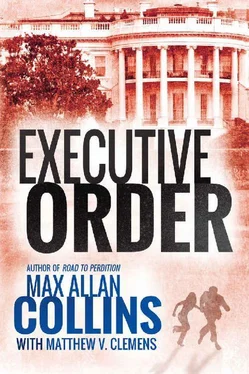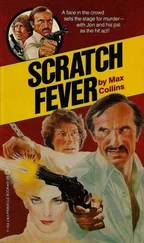Though Rogers was slowly nodding, Hardesy was shaking his head. “This is crazy,” he said. “That mess last year has softened your skulls. You’re talking conspiracy-nut nonsense.”
She said, “The Secretary of the Interior was murdered, as we’ve established. But till we waded in, there’d been virtually no investigation. Did somebody make sure of that?”
Hardesy kept shaking his head.
Reeder said, “Someone sent four top CIA agents to die in a country on the brink of war where the President himself had made it clear he did not want any American presence.”
“Come on, Joe,” Hardesy said, but he was weakening. “You know over at the Company the right hand doesn’t know what the left hand is doing.”
“But does the far right?” Reeder asked. “Or for that matter, the far left?”
Her eyes on Hardesy, Rogers said, “Then there’s what happened with Joe’s all-but-retired CIA friend... not to mention the suspect who got blood on my jacket. Face it, Lucas, only someone with real power could do that... someone on the inside.”
“Not one someone,” Reeder corrected. “A group.”
Hardesy held up his hands in what was not quite surrender. “Wait, guys, wait... what if there’s no real connection between these events? What if it’s all just a coincidence? Isn’t it possible we’re rushing to make the evidence fit a theory?”
Rogers smirked. “How many dead bodies add up to a coincidence in your book?”
Reeder said, “No, Patti, your friend Lucas here is right. We can’t just jump to conclusions.”
Her eyebrows went up. “You think that’s what we’re doing? Somebody assassinated a CIA agent right in front of you, and shot a suspect right next to me? And we’re jumping to conclusions?”
“Easy, Patti,” Reeder said, giving her the faintest smile. “We’re both a little rattled by everything that’s gone down today. We need to get our feet under us again.”
She let out a breath, and nodded.
“If, for instance,” Reeder continued, “Amanda was killed for reasons that have nothing to do with what’s going on with the CIA... and we try to shove the two cases together... we could wind up chasing our tails, or worse.”
“Worse?” she asked.
He nodded. “We could add to a climate leading to, no exaggeration, another world war.”
That sent Hardesy’s eyebrows up, but despite what Reeder had just said, Rogers seemed calmer now.
She said, “All right — you’re the consultant, the voice of experience, the great American hero — what should we be doing?”
“Put Altuve on it. Once Mig realizes he may have been hacked, and can use other means to follow up, have him find out everything he can about Amanda... then you two chase down every lead. You may even learn that there’s some other reason she was taken out.”
Rogers was nodding. Then, after a beat, so was Hardesy.
“What’s your next move?” she asked Reeder.
“The police’ve had enough time to look at what happened to Len Chamberlain and go through his effects. I want to know if they found anything. And are they viewing it as a traffic fatality or a murder.”
“And if we do come up with something?”
“You go to AD Fisk and get your task force assigned to the case.”
Rogers gazed at him with narrowed eyes. “I have Fisk. But you have the President. That’s one hell of go-to-guy.”
Reeder nodded. “He’s promised me help, but so far all I can tell him is that someone I talked to on the phone got hit by a car. Not exactly the smoking gun he wants me to find.”
“Okay,” Rogers said, heaving a sigh. “For now, we dig separately.”
Reeder said, “One more thing.” He got in his suit coat pocket and handed her the other burner phone. “Use this.”
“How scared do you want to make me?” she asked, only half-kidding.
“Very goddamn scared,” he said, not kidding at all. “Because if we’re right, and there’s something big and nasty going on, killing us is easier than dealing with whatever we might find.”
He finally sipped his coffee. It was stone cold.
An hour later, Reeder stood in the cool nighttime shadows beside an attached garage in Burke, Virginia. After leaving his car parked three blocks over, he’d taken a circuitous route through backyards and alleys, and felt sure no one was trailing him.
Pretty sure.
His clothes were all dark, a black watch cap concealing his distinctive white hair. Leaning against the side of the garage, he rubbed his hands and wished he’d brought gloves. There were stars, a lot of them, and no clouds, with the cooler temperatures they indicated. Finally he jammed his hands into his jacket pockets as he waited. He had no gun but was carrying his ASP telescoping baton, retracted to its 6.3-inch length, its diameter under an inch.
The quiet of the houses around him was broken by a dog’s indignant barking up the block, then silence. Had the dog been roused by someone else on foot? But no one came along. He could see his breath, and was shifting from foot to foot when he saw headlights.
He moved deeper into the shadows. A few seconds later, the mechanical hum of a garage-door opener announced the rising of the door, and a black Chevy turned into the driveway. The vehicle slowed and eased inside next to a Toyota. Reeder stepped out of the darkness and inside, as the door lowered itself, its mechanics whirring, a single overhead light going on, automatically.
The garage was neatly arranged — a workbench along the right side wall, hanging yard tools opposite, shelves of boxed belongings at the far end on either side of an aluminum door to the backyard; three bikes hanging from the rafters, one each for the parents and one for a grown son now in college.
Reeder knew the owner, and this space, very well. He and his friend had often sat at the workbench talking sports, shooting the shit, and sipping beers out of the mini-fridge in a nearby corner. Now it held only Cokes.
Balding, beefy Carl Bishop, detective with the Homicide Bureau that covered the entire DC area, stepped out of his Chevy and reared back a little.
“Jesus, Peep!” Bishop said, finding Reeder right in front of him. “You wanna give me a heart attack, maybe get yourself shot?”
Bishop, a friend for over two decades, had for all that time used the nickname bestowed upon Reeder by his peers at the Secret Service, due to the then-agent’s kinesics-schooled ability to read people. Reeder didn’t like the moniker much, but pointing that out to longtime friends who used it seemed less than gracious.
“Tell you the truth, Bish,” Reeder said, “getting shot is something I’m trying to avoid.”
The homicide cop stood there, hands on his hips, in an unmade bed of a suit, his tie a loose noose the hangman hadn’t tightened yet. The end, obviously, of another long day.
He said, “Skulking around dressed like a burglar, especially around an armed detective’s domicile, does not seem like the best way to stay un -shot, Peep.”
Reeder took off the watch cap and shrugged. “You call it ‘skulking.’ I call it waiting.”
“To get shot ,” Bishop said, but he was already over his surprise and annoyance. “You want to come in and have a beer? I keep a few cans for my friends who aren’t on the wagon.” He shut the car door. “Stacy would love to see you.”
Reeder doubted that — it was Melanie who’d been tight with Bishop’s wife. The petite blonde was nice enough, but he hadn’t seen her since the divorce.
“Not a good idea, Bish. This isn’t a social call.”
Bishop frowned, nodded, and ushered his friend to the workbench, where high-backed stools awaited. They sat facing each other, swung sideways at the bench, Bishop leaning an elbow and folding his hands.
Читать дальше












